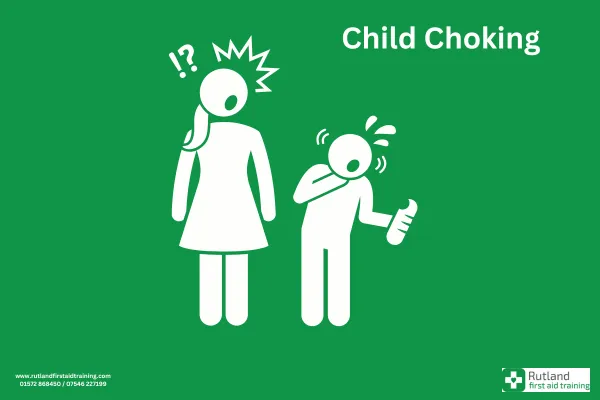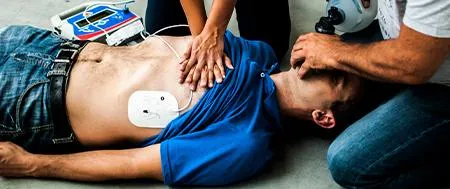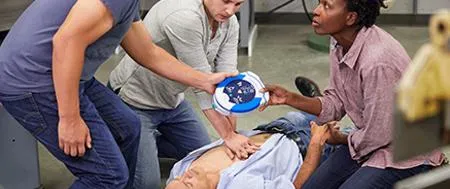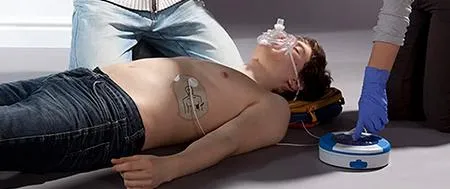Rutland First Aid Training
BLOG

Choking in Children
The shape and size of the food we eat could increase the chances of choking. Foods such as grapes, mini tomatoes, popcorn, peanuts and the small decorations on the tops of fairy cakes can lead to choking as they are all potential choking hazards particularly for children.
Fact 85% of choking deaths are caused by food
Many schools and nurseries ban grapes from packed lunches due to the high potential for choking. However, all you need to do is avoid perfect circles by cutting the food lengthways i.e. batons.
However, it is easy to forget that some chocolates and sweets can be a choking hazard for exactly the same reason- they are the perfect shape to be inhaled into the trachea (windpipe).
Did you know that Cadbury Mini Easter Eggs have a warning on the back of the package? It states that chocolate should not be consumed by children under the age of four, due to this risk of choking.

It is not just mini eggs - Maltesers, Smarties, lollipops and hard candies also have the potential to be a choking hazard in children.
How to respond to a child or infant is choking
First relax and then if you think they are choking ask them “Are you choking?”
If they can breathe, speak or cough then they might be able to clear their own throat. If not then they need your help straight away. There are two ways to remove a foreign object and that is with Back Blows or Deep Stomach Thrusts.
Back Blows in an Infant
First of all support the infant in a head-downward face-down position. This enables gravity to assist removal of the foreign body; then
Sit or kneel as you should be able to support the infant safely across your lap
Now support the infant’s head by placing the thumb of one hand at the angle of the lower jaw, and one or two fingers from the same hand at the same point on the other side of the jaw
And deliver up to 5 sharp back blows with the heel of one hand in the middle of the back between the shoulder blades
The aim is to relieve the obstruction with each blow rather than give all 5
Back Blows in a child over 1 year
Back blows are more effective if the child is positioned head-down and face-down
A small child may be placed across your lap as with an infant, but if this is not possible, support the child in a forward, learning position and deliver the back blows from behind
If a back blow fails to dislodge the object and the child is still conscious, use chest thrusts for infants or abdominal thrust for children.
Deep Stomach Thrusts
Deep Stomach Thrusts in a child over 1 year
Stand or kneel behind the child and place your arms under the child’s arms and encircle their torso
Now clench your fist and place it just above your child’s navel but below the tip of the breastbone
Place your other hand over the outside of the fist then bend your arms and elbows outward to avoid squeezing the ribcage and perform up to five quick inward and upward thrusts
Repeat up to 4 more times
The aim is to relieve the obstruction with each thrust rather than to give all 5
If the object has not been expelled and the victim is still conscious, continue with the sequence of back blows and chest (for infant) or abdominal (for children) thrusts.
Call out or send for help but if none is immediately available then UNDER NO CIRCUMSTANCES LEAVE THE CHILD!
If the object has been expelled, assess the child as it is possible that part of the object is still in the airway and can cause complications, but if there is any doubt then seek medical attention.
IF the infant or child becomes unconscious begin CPR and call 999
About Us
Rutland First Aid Training provides a full suite of first aid training all tailored to your needs. We strongly recommend that everyone should have some basic first aid skills, so why not attend one of our paediatric courses, for example our one day Care for Children course.
Rutland First Aid Training provides this information for guidance and it is not in any way a substitute for medical advice. Rutland First Aid Training is not responsible or liable for any diagnosis made, or actions taken based on this information.
First posted 19th March 2021
Hear what our first aid students have to say...
TESTIMONIALS


A really good training course, very professionally presented by Tracy. I’ve been on lots of training courses over the years and too often they can be soporific! Tracy is one of those rare training professionals who can deliver training and keep a person interested all day! Great course. Highly recommended!

Alan Eager
Google Review


Rutland first aid are professional yet kept the courses fun and interactive and use some very interesting props. As a driving instructor I wanted to be able to deal with any issues with my students but also any issues I may come across on the roads. Highly recommended.

James Dames
Google Review


Couldn't recommend Tracy and her team enough for a first aid course. Having to renew it every 3 years used to send me to sleep. Not with these guys! Professional, up to date and with lots of toys to play with, without the death by powerpoint.

Mike Gould
Google Review

Here at Rutland First Aid Training we strive to provide high quality, personalised, fun and informative first aid courses.
Our courses are recognised by HSE, Ofsted and follow ILCOR guidelines.
Short Cuts
Find what you are looking for:
Dental CPD Courses
Get In Touch
If you have any questions or would like to discuss your requirements in further detail, our team are always happy to assist you.
Unit 2B Station Approach, Oakham, Rutland LE15 6QW
@ 2025 Copyright Rutland First Aid Training. All rights reserved.
Rutland First Aid Training is a trading name of Dive Rutland Limited. Company No: 9433835.




